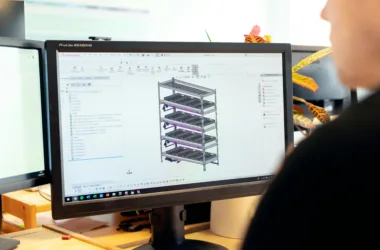Is landing your dream software engineer job just one interview away? But, are the behavioral questions making you more nervous than the coding tests?
Knowing how the software engineer interview process works is essential to get that dream job. The technical part tests your coding and system design skills. However, it’s the behavioral interview that checks if you’ll fit in with the company’s culture. Yangshun, a former engineer at Meta, says this part is often overlooked but very important. It shows how you deal with conflicts, work in teams, and face challenges at work.
Indeed, many applicants don’t realize the importance of soft skills during the interview process. The behavioral interview looks at more than just how well you code. It focuses on your communication, problem-solving, and time management. Top tech companies like Amazon, Google, and Meta all agree that these skills are crucial.
Curious about what makes this part of the interview so rich and important? Let’s dive into mastering the behavioral interview. It can really help you stand out in the competitive field of tech.
Understanding Behavioral Interviews
Many tech companies like Facebook, Airbnb, and Lyft use behavioral interviews during their hiring process. They evaluate a candidate’s personality, skills, and past actions to see how they might do in the future. These types of interviews are great for showing off a candidate’s problem-solving skills.
What are Behavioral Stewart?
Behavioral interviews look at what you’ve done before, not just what you know. They believe your past actions predict your future ones. Candidates are asked to share detailed stories about their experiences. This shows their problem-solving skills and how they handle working with others.
Why Employers Use Behavioral Interviews
Employers want to dig deep into your past work experiences with behavioral interviews. They see if you have the right skills and mindset for the job. By asking for examples, they learn about your leadership, teamwork, and how you adapt. This helps them figure out if you’ll fit well in the team and company culture.
Platforms like interviewing.io let you practice behavioral interviews with pros from big tech companies. “Behavioral Interviews” by Exponent and “Grokking the Behavioral Interview” on Educative are great courses to get ready. Candidates should use the STAR method (Situation, Task, Action, Result) to answer questions clearly and show off their problem-solving skills.
The STAR Method for Effective Answers
Behavioral interviews are now common for software engineering managers. The STAR format is key for candidates to shine. It stands for Situation, Task, Action, and Result. This method helps share past experiences, showing problem-solving and decision-making skills.
To use the STAR format, you talk about a situation you faced, the task you needed to do, the actions you took, and the results. This way, your answers stay on point. They tell a story that highlights what you can do.
-
Set the context for your story
-
Describe the situation, including the relevant details
-
Keep it brief and to the point
-
Explain the task or challenge you faced
-
Describe your responsibilities and goals
-
Clarify what was expected of you
-
Describe the specific actions you took to address the task or challenge
-
Focus on your role and what you did, not what others did
-
Highlight your skills, abilities, and accomplishments
-
Share the outcome of your actions
-
Quantify your results wherever possible (e.g., “increased sales by 25%”)
-
Emphasize what you learned and how you grew from the experience
Using the STAR method helps candidates show their achievements in a structured way. Behavioral interviews look at past actions to guess how you’ll do on the job. Getting good at the STAR format lets you share your skills clearly and effectively.
Key Behavioral Questions to Prepare For
Getting ready for a software engineer behavioral interview can greatly boost your chances of getting the job. It’s important to know common interview questions and think about your answers ahead of time. This preparation is key to acing your interview.
Commonly Asked Questions
Big tech firms like Google, Microsoft, and Amazon usually ask a set of questions to test your people skills. Here are some examples:
- Describe a time when you had to resolve a conflict within your team. What was your approach?
- Can you provide an example of a project where you faced significant challenges? How did you overcome them?
- How do you prioritize tasks when working on multiple projects simultaneously?
- Tell me about a time when you had to adapt to a sudden change in the workplace. How did you manage it?
- Give an example of a decision you made that was initially unpopular but proved to be the right choice in the end.
Sample Answers for Practice
To shine in a behavioral interview, create answers that show how you solve problems and work in a team. Here, we use the STAR method (Situation, Task, Action, Result) to answer some behavioral interview questions.
-
Describe a time when you had to resolve a conflict within your team.
-
Sample Answer:
-
Situation: During a critical project, two team members disagreed on the approach.
-
Task: As the team lead, I had to solve this and keep the project going.
-
Action: I arranged a meeting for them to share their views and find a solution.
-
Result: We found a solution they both liked, which helped the team and kept the project on track.
-
-
-
Can you provide an example of a project where you faced significant challenges? How did you overcome them?
-
Sample Answer:
-
Situation: We ran into unexpected tech issues in a crucial project, putting our deadline at risk.
-
Task: My job was to fix these issues fast.
-
Action: I worked with the team to find and implement solutions, keeping everyone informed.
-
Result: We finished on time, and our fixes made the system much more reliable.
-
-
-
How do you prioritize tasks when working on multiple projects simultaneously?
-
Sample Answer:
-
Situation: In my last job, I often juggled several projects with close deadlines.
-
Task: I had to make sure everything was done on time without losing quality.
-
Action: I used management tools to track all projects and adjusted priorities as needed.
-
Result: This method let me meet all my deadlines and produce great work.
-
-
-
Tell me about a time when you had to adapt to a sudden change in the workplace. How did you manage it?
-
Sample Answer:
-
Situation: We suddenly had to focus on a new project because of changes in the market.
-
Task: I had to get the team ready for the new project quickly.
-
Action: I held training sessions and used agile methods to adapt fast.
-
Result: The team adapted well, and we launched the new project early.
-
-
-
Give an example of a decision you made that was initially unpopular but proved to be the right choice in the end.
-
Sample Answer:
-
Situation: I chose to refactor a large piece of code, which wasn’t popular at first because it seemed like it would take too much time.
-
Task: I had to show the team why this would help us in the long run.
-
Action: I explained the current issues, the benefits of refactoring, and led the process.
-
Result: After the refactor, our work was easier and the system worked better.
-
-
These examples are a practical way to plan your own answers. Good interview prep means looking back at your past experiences and showing how you handle different situations at work. By practicing these answers, you’ll be ready to face your interview with confidence.
Top Skills Evaluated in a Software Engineer Behavioral Interview
In a software engineer behavioral interview, they check many key skills for tech roles. This includes leadership, working well in teams, and good communication. The interview, usually 45 minutes, talks about your work history and lets you ask questions. Employers want to see if you’ll fit well in their team.
People Skills and Conflict Resolution
How you handle people and solve problems is really important in these interviews. Teams work best without conflicts. At Meta, they look at how new engineers help their team focus, which needs good talking skills. Hiring the right people is key, so they focus on picking those who can solve issues well.
Team Collaboration and Communication
Being able to work in a team and communicate well is crucial for software engineers. Interview questions might ask about when you worked with others to finish a project. Meta assesses senior engineers on their teamwork, especially if they work with three or more people. It shows how teamwork is vital for success.
Leadership and Initiative
Leadership is very important, especially for higher-level jobs. Companies want leaders who can take charge of projects and guide their team. Meta wants staff engineers who make big changes that help everyone. Good leadership means being able to start new things and move teams forward.
Preparing for the Software Engineer Behavioral Interview
Succeeding in a behavioral interview for software engineers requires good prep. It’s key to show you fit well with the company culture. This is especially true for senior roles, where understanding the company’s values and teamwork is vital.
Research the Company’s Core Values
Checking out a company’s main values is key. Businesses like Google, Facebook, and Apple value innovation and teamwork. Sharing your stories that match these values can help.
Digging into these values can make you shine during interviews. It shows you really care about fitting in with their culture.
| Company | Core Values |
|---|---|
| Innovation, Collaboration, User Focus | |
| Meta | Move Fast, Be Bold, Focus on Impact |
| Apple | Creativity, Simplicity, Customer Commitment |
Create Stories for Common Scenarios
It’s smart to have stories ready that show your skills and values. Cover topics like solving conflicts or leading teams. The STAR method can help you tell these stories well.
Talk about times you solved a problem or led a team to success. These stories show you’re a problem-solver and a leader. Traits crucial for software engineers in interviews.
Your stories should show you can lead, work with teams, and handle conflicts. This prep sets you apart from other candidates. It’s a key step to stand out.
In short, researching and crafting stories are top strategies for interview prep. They show you’re a great match for the company. Follow these steps to make a strong impression.
Mock Behavioral Interviews: Practice Makes Perfect
Mock interviews are key for those prepping for software engineering interviews. These sessions mimic a real interview, making candidates comfortable talking about their skills. They help find areas to improve.
Importance of Mock Interviews
Practicing with mock interviews is crucial. It lessens interview nerves and polishes how you communicate. Tools like Pramp are useful, aiding many in getting jobs at places like Google and Microsoft. Pramp boosts confidence and skill in explaining thoughts clearly. This preparation is key for a great interview and to understand what recruiters want.
Practice through mock interviews preps software engineer hopefuls well. It gets them ready for real interviews, reducing stress. These sessions simulate real conditions, covering common behavioral questions.
Resources for Mock Behavioral Interviews
Choosing the right mock interview resources is vital for readiness. Platforms like interviewing.io offer real-like interviews with experts. They prepare you not just technically but also behaviorally. Pursuit Transformation Company Inc. helps with job placements at top tech firms, with grads moving to much higher salaries.
Pramp is known for structured sessions that boost confidence and communication skills. Users often end up with several job offers after practicing. Pramp’s real-world scenarios help understand what employers look for.
Here’s a summary of mock interview resources and their benefits:
| Platform | Key Benefits | Success Stories |
|---|---|---|
| Pramp | Reduces interview stress, improves thought process explanations, boosts confidence | Job offers from Google, Bloomberg, Microsoft |
| interviewing.io | Hands-on technical and behavioral interview practice | Insightful feedback from industry professionals |
| Pursuit Transformation Company Inc. | Comprehensive training, extensive mock interviews | Placed candidates at Amazon, Uber, Citi |
Examples of Successful Behaviors in Top Tech Companies
Companies like Meta, Airbnb, and Lyft focus a lot on behavioral interviews. They want to make sure the people they hire fit well with their values and the way they work. Stories from candidates who did well in these settings show what behaviors and attitudes are needed to meet the expectations of big tech firms.
Insights from Meta, Airbnb, and Lyft
Meta, Airbnb, and Lyft take behavioral interviews seriously to pick the right candidates. They use the STAR method. This stands for Situation, Task, Action, Result. It helps organize answers clearly.
During these interviews, they ask about soft skills. Skills like working in teams, solving disagreements, managing time, and being adaptable are important. They look for answers showing good problem-solving and the ability to manage tasks well. This is crucial for working efficiently and finishing projects on time.
Here are insights from real experiences at these companies:
-
Meta
-
Behavioral Focus: Leadership and Adaptability
-
Example Scenario: Leading a team through a significant project pivot mid-way.
-
-
Airbnb
-
Behavioral Focus: Team Collaboration
-
Example Scenario: Resolving conflicts within a multicultural team to meet tight deadlines.
-
-
Lyft
-
Behavioral Focus: Problem-Solving Skills
-
Example Scenario: Overcoming technical challenges in ride-sharing algorithms under time pressure.
-
Behavioral interviews at these firms assess more than just tech skills. They also check if candidates fit the company culture and can succeed in their fast-paced worlds. By sharing past experiences of adaptability, teamwork, and solving problems, candidates can show they’re a good match for these tech giants.
Strategies to Stand Out in Your Behavioral Interview
In the current job scene, having more than technical skills is key. You must leave a powerful impact in your behavioral interview. Highlighting how you tailor your answers and share unique stories can set you apart.
Personalizing Your Responses
To stand out, personalize your answers. Connect your stories to the job by linking personal experiences with technical skills. It’s important to relate your background, passions, and the company’s goals.
-
Describe a conflict you’ve handled at work.
-
Examples: Explain how you resolved a technical disagreement in a team project, highlighting empathy and collaboration.
-
-
What motivates you in a software engineering role?
-
Examples: Share a personal story of when you felt particularly passionate about a coding project.
-
-
Why do you want to work here?
-
Examples: Demonstrate your passion for the company by connecting its mission with your own career goals and values.
-
-
Where do you see yourself in five years?
-
Examples: Articulate your future aspirations clearly, showcasing your drive and passion for growth within the industry.
-
Make your answers personal and think about what makes you unique. This helps you leave a lasting impression.
Showcasing Unique Experiences
Employers seek candidates with unique experiences. Share stories where you’ve shown innovation, leadership, or solved tough problems during your interview.
For example, talk about a tough project and how you guided your team to success. Share how you handled feedback, acknowledged weaknesses, and improved. Share how you resolve conflicts in a clear and credible way.
Your goal is to present a full picture that shows your technical and personal skills. Use detailed stories from your life to underline your values and match them with what the employer is looking for.
Conclusion
To do well in a behavioral interview, you need to know your strengths and how the company works. It’s clear now that being real and well-prepared is key. You should answer in a way that matches the company’s values. Talking about past jobs using the STAR method helps you tell your story well.
Thinking over your interview is crucial too. It helps you see what you can do better next time. Evaluating how your answers match the job lets you improve how you show your skills. This way, you keep getting better and stand out in future interviews.
Behavioral interviews look at your skills and how you work with others. For software engineers, it’s important to research the company, share personal stories, and answer questions clearly. Doing this sets you up for success. You’ll be ready to get a job that’s a great fit for you.






